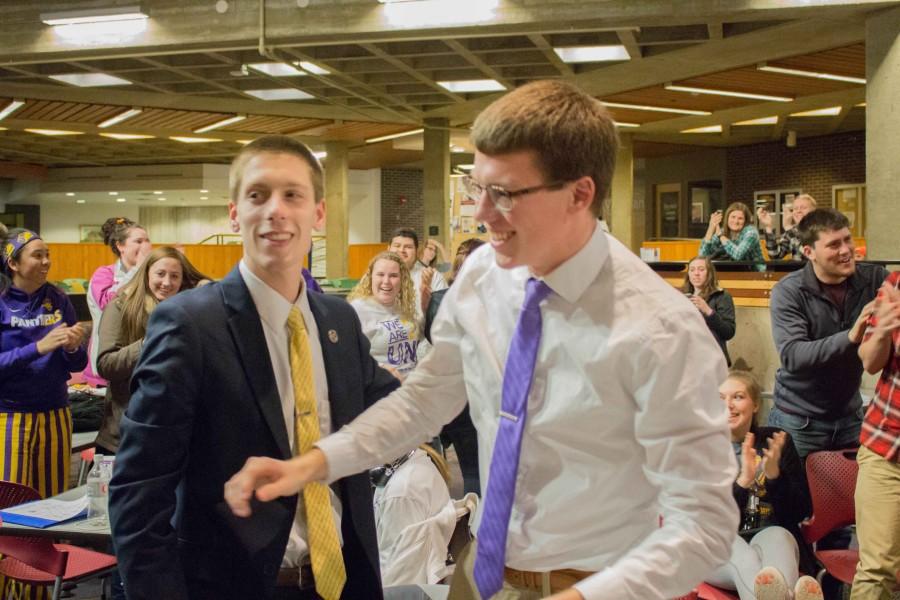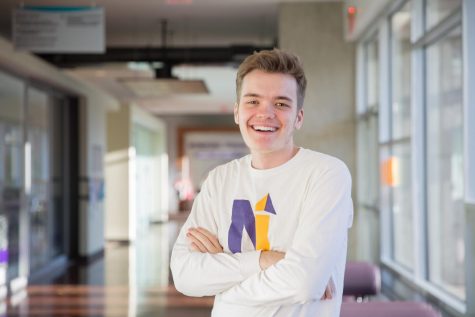Despite allegations, election results untainted
Hunter Flesch and Avery Johnson celebrate their NISG presidential election win. Sanctions had been considered for each campaign.
Mar 7, 2016
On Feb. 24, sophomores Hunter Flesch and Avery Johnson were named the new student body president and vice president. Flesch and Johnson had earned 1,187 of the 2,072 total votes that were cast on MyUniverse, beating out opponents Jamison Whiting and Aaron Friel.
The results were announced after an hour-long delay and several hours of deliberations by the Northern Iowa Student Government (NISG) judicial branch regarding allegations leveled at both presidential campaigns.
Senior psychology major, Nathan Davis, who serves as the chief justice of the NISG Supreme Court (and de facto election commissioner), participated in the deliberations.
According to Davis, the allegations that were leveled at the Whiting/Friel ticket were: improper solicitation within Department of Residence (DOR) buildings, solicitation within Maucker Union and advertising near polling stations, which are defined as any public computer that is made for student access.
The Flesch/Johnson ticket was charged with two allegations: early campaigning and advertising near polling stations.
“The delay [happened because] we had proposed a number of different solutions trying to wrap up these allegations and impose the sanctions that we believed were the most fair and orderly,” Davis said.
Although no votes were sanctioned in the final tally, Davis said hours of debate led to that ultimate decision.
Davis explained that the election commission sought the input of Lisa Kratz, NISG’s faculty advisor, and Jan Hanish, vice president for administration & financial services, to explore sanctions that they could impose.
Hanish, who had been called into the deliberations to provide background from her previous experiences, praised the responsibility demonstrated by both the judicial branch and the presidential tickets.
Davis stressed that during the deliberations, the judicial branch hadn’t opened the ballots or seen the election results.
Flesch commended the election commission’s ability to remain impartial throughout the proceedings.
Davis said the election commission had considered sanctioning votes for both presidential tickets; they had proposed discounting up to 122 votes for the Whiting/Friel ticket and up to 20 votes for the Flesch/Johnson ticket.
Davis said that these numbers came from a formula that took into account several variables, such as the amount of voters reached and the nature of the allegations.
According to Davis, the election commission decided to respond to the allegations by issuing a public censure, rather than withholding votes.
Davis went on to explain what the public censure, which is in its draft stage, will entail.
“The judicial branch is going to come out with a description of the allegations, a description of our votes as to how many of us believe the allegations to be true based upon the evidence presented to us and our thoughts on those specific campaign violations,” Davis said. “Our hope with this is to highlight the issues that we had during the election to give the student body more information about what had occurred and what we believe would be proper sanctions for future violations of the same nature.”
Davis said that the allegations were unprecedented because they came towards the end of the election from a number of different sources, many of whom were informed students.
Whiting questioned the neutrality of the allegations, saying that “most informed students pick a side.” He went on to discuss the need to make the NISG election rules clearer so as to prevent future campaign infractions.
“I think that the election rules do need to be cleaned up quite a bit because it is extremely broad,” Whiting said. “If it is clear, people aren’t going to [break election rules]. If it is right there in front of your face, then you don’t have to have a two and a half hour long discussion about what’s going to happen.”










